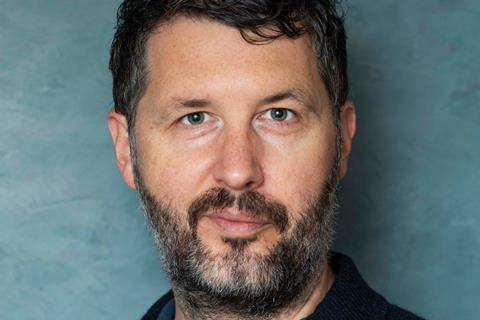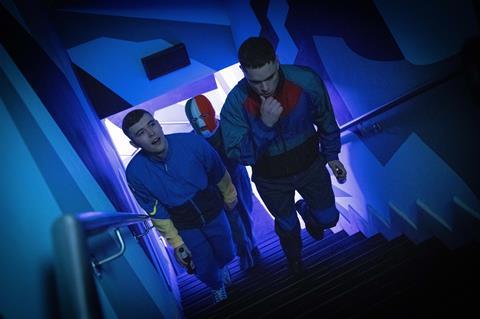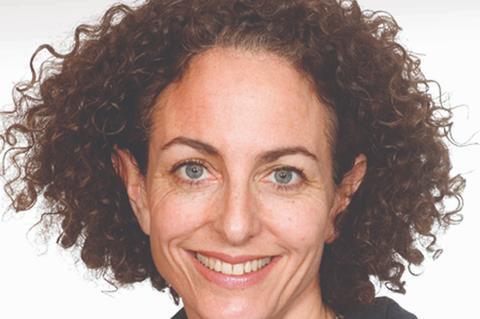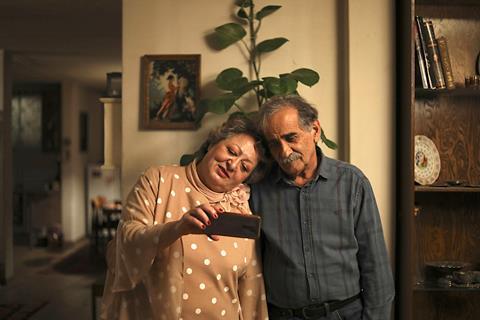
Ed Fletcher has been at the helm of UK distributor and exhibitor Curzon for six months as CEO, following the departure of Philip Knatchbull from the Cohen Media Group-owned company in November 2023.
Fletcher brings with him experience spent managing cinemas in London and Cambridge, and working in theatrical distribution at first ICA Projects and then distributor Soda Pictures, the company he co-founded with Eve Gabareau in 2002 that became Thunderbird Releasing in 2014. He also runs a production label called Beef with Emma Biggins as a sideline to his day job.
Just before Cannes, Curzon revealed the revival of the Artificial Eye distribution label to be overseen by the company’s highly respected managing director Louisa Dent. It will run parallel with the main brand, Curzon Film, for which Sundance sensation Kneecap will be one of the first releases. The Irish-language film was one of the first recipients of the Mother Tongues Award, the development initiative backed by Curzon, French sales agent Charades and creative agency Intermission Film.
Fletcher talks to Screen about his plans for Artificial Eye, the strategy around windows, working with Cohen Media and Cohen stablemate HanWay Films, and why he is optimistic about the future.
The last time Screen spoke at length with Curzon, it was October 2020. At the time there were 20 Curzon cinemas. What are the numbers nearly four years on?
There was only one Covid casualty, which was Ripon in Yorkshire which did not reopen. The operating environment was too challenging. Kingston and Camden were just opening [in 2020] and they have been growing nicely.
Have you been to them all?
Almost. I haven’t been to Kingston yet. Hoxton is my local.
In October 2020, Curzon Home Cinema had 60,000 members. How many are there now?
It’s less about membership and more about customers. Like every platform, there was a Covid bounce in terms of people seeking new content. But number one, we’re a cinema company. No one likes getting better platform numbers and not seeing people in your cinemas.
Under Philip Knatchbull, there was a move to day-and-date releasing on the platform and in cinemas. Is day-and-date still the priority?
No. Curzon Home Cinema was a great innovation of its time. At the time, Netflix was doing Roma, conversations about windows were at the fore of the industry and Creative Europe supported the creation and expansion of pan-European VoD platforms.
Covid changed the whole windows conversation and allowed us to have a friendly relationship with streamers from Roma onwards and that lives on in our positive relationship with Netflix.
But, before I had this job, it struck me when I went to a Curzon cinema and saw a trailer for Curzon Home Cinema, I just thought, “Maybe not”. The message I want to hear is, “Cinema is great and maybe you should be coming to the cinema more.”
The difficulty with day-and-date, as with any rigid model, is you are always going to lose out on some things. Certain producers didn’t want to go day-and-date and because you need a volume of films you end up playing new films that don’t fit your quality brand.
If you are always promoting day-and-date, the thing that misses out is the heritage – your catalogue, your library, the thing that helps the customer discover new films.
Had Curzon started moving away from day-and-date before you arrived or is it your strategy?
No, I’ve moved it away from day-and-date. But all of the [existing] strategies were in place up until The Teachers’ Lounge [released in April 2024]. It is now going forward with films like Kneecap and also My Favourite Cake which will relaunch Artificial Eye. Most films won’t be day-and-date but that’s not to say with the right film it’s still a strategy. But it’s now an option rather than a default.

What length of theatrical window will you generally give a Curzon film?
There are now a lot of different models which is what distribution was always looking for. It is finding the right model for each film. With Kneecap for example we might want to do a super-traditional 16-week window when it opens in August.
Tell me about Artificial Eye. I didn’t realise it had closed.
It has actually been 10 years since a film has been released as Artificial Eye. It had gone away for quite a while. Curzon Artificial Eye, which is what it was called for a period, has always been a collection of three different companies [cinemas, distribution, streaming]. Quite rightly, what Philip did with Home Cinema was create what he called a Curzon Film World, which was about having this diverse, integrated, audience-facing offer.
A number of things have changed. Social media for one. Artificial Eye is a sign of discerning quality. Its history speaks for itself. Its catalogue speaks for itself. It’s a more curated range.
Is Artificial Eye now the distribution strand of Curzon?
No. Curzon, which has been the distribution brand for the last five-ish years, remains our core distribution brand. Curzon is Sainsburys, Artificial Eye is the more curated Taste the Difference arthouse range.
We have a range of cinemas, it’s not all about Bloomsbury and five screens of arthouse films. One of our most successful cinemas now by admissions is our Oxford site which is predominantly a mainstream offer.
Why is that?
It’s a combination of what audiences want to see and running a business and what that area can sustain. Projection has changed, digital has changed. Most cinemas have got more screens now. If you are a five-screen cinema in a regional town, there aren’t enough [arthouse] releases in the market to replicate the Curzon Bloomsbury model. But I’m committed to developing audiences for independent film in those cities. You want a film like The Teachers’ Lounge to work in those cinemas but it takes time to nurture that audience.
How will the two brands co-exist?
The Curzon brand and the kinds of films we show is already way broader than the London industry thinks it is. We have a programming team, not an algorithm, that makes sure we’re showing the best of all films. The opportunity here is to be a bit broader with Curzon Film. Kneecap is a perfect example of that. It is an accessible, great Irish/British drama with political edge, that can play comfortably in all of our cinemas. That runs alongside a specialty label that cineastes love and trust that can add to that library of great movies.

Who is in Cannes watching films?
Louisa Dent, who heads up Artificial Eye, and Ele [acquisitions manager Eleonora Pesci]. The three of us and our programming team of four. We’ve also got our development fund headed by Kristian Brodie.
How do you see the £1.2m development fund working best?
As a distributor-led development fund between Curzon, Cineart in Benelux and Madman in Australia, it is a conscious effort to bring our collective market expertise to the development process in a set-up that will ideally go through to distribution.
How many films have you developed through the fund?
We’ve done a dozen films. Some have been made and been released. We did Merkel and Swimming Home, the latter of which Bankside is selling. We’ve just finished Bad Apples. We developed that and teamed up with HanWay who are next door.
Even though we won’t be distributing the film, we’re acting like a talent development company using our collective acquisitions skills to develop projects and essentially flip them [to studios and streamers].
I’m a big believer in being part of an ecosphere. We’ve got an issue in the UK about finding more of a domestic audience for our own films and we’ve got lots of ways in which we could participate in trying to be part of that encouragement. Having some role in production and helping projects get over the line is one part of that jigsaw.
Is there any change to how you are working with HanWay?
One of our biggest opportunities is thinking how we work across the group and how we and HanWay can contribute more to British film, and play more of a role linking up distribution and sales and production.
We’ve got an overlap and we’ve worked together on things. But we’ve all got to be open to partnerships with other people. Post Covid, everything has been challenged and I think everyone’s thinking more reducing risk by being a little bit more together.
Which brings me to your relationship with Cohen. Do you co-acquire?
Yes, we’re both releasing Marco Bellocchio’s Kidnapped at the moment which we acquired last year in Cannes. We are doing the Merchant Ivory documentary that played in BFI Flare and was produced by Cohen Media. They’ll release it in the US, we’ll release it in the UK.
It’s always difficult for distribution companies in different territories to have exactly the same profile because the markets are so different. Different idiosyncrasies, different competitors, different scales. So we’re super-friends in the same family, we talk to each other. And co-buy where it makes sense.

How hands-on with Curzon is Charles Cohen?
What’s lovely about Charles is that he is a film guy. He goes to the cinema and watches films. When you come back to the why of your business, why he owns Curzon and why he owns film companies, why he is interested in archives and is an active producer, he brings that passion and enthusiasm to it. But equally he’s not in the UK, so there is a fair amount I have just got to get on with.
He’s a property guy as well. Cinema property is a core part of our business so he’s incredibly valuable.
Are there any plans to expand the Curzon brand into Europe?
Charles is opening a cinema in Paris next year. We haven’t got as far as what it will be branded. But whether it’s Landmark [Cohen’s US cinema chain], Cohen or Curzon, it’s irrelevant. It’s a nice idea expanding but it’s still got to run independently however it is branded.
Two years ago, why did Lionsgate buy Triangle Of Sadness from Curzon, the Palme d’Or winner that turned out to be a savvy pre-buy for Curzon?
It’s a necessary way for distributors to operate at a certain level. The reality is your buying of that film is already based on the idea you can partner up. The risk is already too big. All of us UK indies, Picturehouse, Altitude, Curzon and Vertigo, none of us have an output deal with a streamer. If you are going to go in with a six-figure numbers on an MG, it’s about having a partner in that space. Either you’re partnering directly with a streamer [on that single film] and there’s a deal to be done, or [with] other people who are bigger than you [and] do have output deals. If they haven’t acquired enough films themselves, there are slots where they can partner with other distributors to fulfil their output deals. Soda used to do stuff with MGM for example.
Are you optimistic about the future of the UK independent exhibition and distribution business?
Definitely. As a cinema chain, we are 44% up year on year in terms of admissions. We are looking at organic growth and are interested in new opportunities. I have inherited a Save the Curzon Mayfair campaign and we are… continuing to save it.
Are you still producing through Beef?
Emma Biggins and I have got a little handpicked selection of projects. Some are cast, some are financed. Producing is a hobby for me. I’m very conscious of any potential conflicts of interest. I’m not going to suddenly put a Curzon MG into the finance plan.
Our model at Beef was much more, “How do we collaborate with younger and first- and second-time producer and director teams?” Emma is a hardcore line producer and I am more about the market. The producers we are working with are doing most of the driving and we’re doing the advising and packaging kind of things
If you could click your fingers and transform anything about the industry, what would it be?
It is around collaboration. Having a stint as an independent producer has been quite sobering. The reality of building finance plans has shown me how different parts of the industry are engaged/not engaged with each other.
If you want more diverse producers, you can’t then tell them to defer their fee. It’s about understanding different parts of the business, being more partnership orientated, being more present together, and having conversations.

























No comments yet